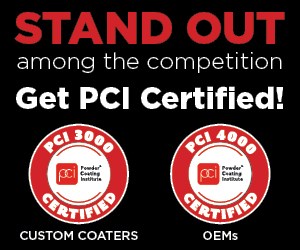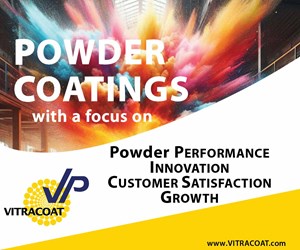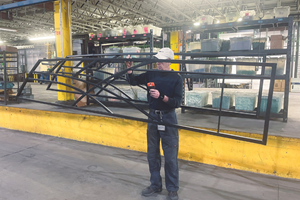Q&A: Film Thickness Control
A reader asks powder coating expert Rodger Talbert: What can we do to better control the thickness of the powder on our parts?
Q. We are having some trouble controlling the thickness of the powder on our parts. We have some light coat areas in recesses and edges, but we also get orange peel and heavy coating in some other areas. What can we do to control the thickness better? P.T.
A. Coating thickness is controlled by the use of a standard set of operating variables that affect film build. There are many variables involved but the critical controls include:
• Gun-to-target distance
• Electrostatic settings (voltage and micro-amps)
• Flow rate and powder velocity
• Number of strokes or dwell time in front of the gun
To develop an optimum set of controls you need to do some experimentation and verification. Try full voltage and amperage to start with a medium to low setting on flow rate, average distance (6 inches for manual guns and 12 for automatic guns) two to three passes. Use medium to slow strokes with some overlap of your pattern.
For complex shapes, reduce the amperage and voltage and coat difficult areas first. Observe the spray pattern to see how much velocity you have (high velocity is bad) and note how much overspray is generated. If the overspray is low and the coverage is good you are fine. Increase flow if you need more powder, decrease flow if you have a lot of overspray. Establish a standard set up and be consistent.
In addition to the gun settings and optimum control, the atmosphere can affect film thickness control. If the humidity is too high the powder will not fluidize or flow very well. If the humidity is too low the powder will behave differently when exposed to an electrostatic charge and potentially produce more rejects for lumps and light coating. The optimum range for humidity is 40 to 60 percent RH.
Control of the reclaim powder is important, too. If the powder is recycled in a cyclone recovery system, it will gradually move the particle size distribution higher due to the fact that the cyclone classifies out some of the finer particles. In a module system, the impact on reclaim is the opposite: the particle size distribution will gradually move to a finer overall mean as a result of the accumulation of finer particles. A cartridge module system does not remove any fines and history has demonstrated that 100 percent reclaim will have a finer grind size than virgin powder. To control this, make sure to consume the reclaim and do not let it accumulate. Keep the First Pass Transfer Efficiency at or above 50 percent to make sure that fines do not accumulate.
One final and very important control item is the earth ground. If you want film uniformity, control the ground at all times. Clean hooks are imperative to film build control. Control the gun, control the powder and control the atmosphere surrounding your application area. This will give you the best possible film build control.
To read more of Rodger Talbert's answers to readers, click HERE
Related Content
5 Maintenance Tips for Gas Catalytic IR Ovens
Basic and periodic preventive maintenance is essential for avoiding oven downtime.
Read MoreCuring Oven Basics
Simply heating up the substrate does not cure the coating. There are many variables to consider when choosing the best cure oven for your application...
Read MoreWicket Ovens Making a Comeback
International Thermal Systems supplies curing ovens designed to cure coatings applied to one side of a tinplate, aluminum, or steel sheet.
Read MorePowder Coating Overcomes Post Forming
Six Sigma methodology, open communication, and collaboration produce results for leading boat manufacturer.
Read MoreRead Next
A ‘Clean’ Agenda Offers Unique Presentations in Chicago
The 2024 Parts Cleaning Conference, co-located with the International Manufacturing Technology Show, includes presentations by several speakers who are new to the conference and topics that have not been covered in past editions of this event.
Read MoreEpisode 45: An Interview with Chandler Mancuso, MacDermid Envio Solutions
Chandler Mancuso, technical director with MacDermid Envio discusses updating your wastewater treatment system and implementing materials recycling solutions to increase efficiencies, control costs and reduce environmental impact.
Read MoreEducation Bringing Cleaning to Machining
Debuting new speakers and cleaning technology content during this half-day workshop co-located with IMTS 2024.
Read More


























